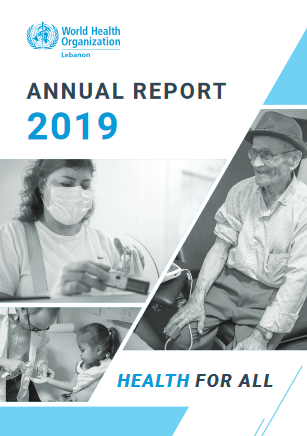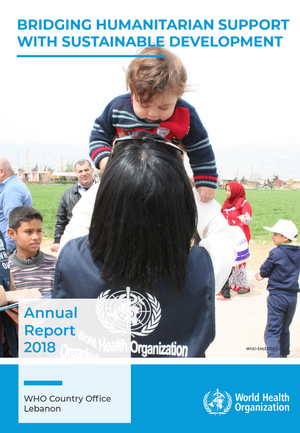WHO Lebanon publishes 2019 annual report
 In 2019, Lebanon witnessed an increased rise in health and humanitarian needs. The ongoing political instability and insecurity, as well as the consequences of the protracted conflict in the neighbouring Syrian Arab Republic, have led to a further burdening of the health system in Lebanon. By the last quarter of 2019, Lebanon was facing an unprecedented economic and financial crisis, jeopardizing access to and availability of health services, and further impairing the coping capacities of already vulnerable Lebanese and refugees. Unemployment rates grew enormously, threatening social stability.
In 2019, Lebanon witnessed an increased rise in health and humanitarian needs. The ongoing political instability and insecurity, as well as the consequences of the protracted conflict in the neighbouring Syrian Arab Republic, have led to a further burdening of the health system in Lebanon. By the last quarter of 2019, Lebanon was facing an unprecedented economic and financial crisis, jeopardizing access to and availability of health services, and further impairing the coping capacities of already vulnerable Lebanese and refugees. Unemployment rates grew enormously, threatening social stability.
The year also witnessed an ongoing measles outbreak in the country and ended with the global threat of the coronavirus disease (COVID-19) outbreak in China by December. Nevertheless, 2019 was also marked by important achievements in public health in Lebanon. The country sustained its polio-free status, access to primary health care for vulnerable populations was maintained, health system strengthening interventions were accelerated, and the early warning and alert system was fully automated and expanded.
WHO in Lebanon publishes 2018 annual report
 Bridging humanitarian support with sustainable development In 2018, Lebanon faced several challenges, including ongoing political instability and insecurity, as well as the consequences of the protracted conflict in neighbouring Syria, which has led Lebanon to host the highest number of refugees per capita in the world.
Bridging humanitarian support with sustainable development In 2018, Lebanon faced several challenges, including ongoing political instability and insecurity, as well as the consequences of the protracted conflict in neighbouring Syria, which has led Lebanon to host the highest number of refugees per capita in the world.
This social, economic, and political context has contributed notable pressure to an already strained healthcare system. For this reason, not only has the World Health Organization persisted in 2018 in its collaboration with and support to the Ministry of Public Health and the Government of Lebanon as a whole, but 2018 also marked a crucial moment in the history of the WHO’s work in Lebanon with the signing of the Country Cooperation Strategy for 2019-2023.
The Country Cooperation Strategy 2019-2023 is a symbol of the continuous partnership between WHO and the Government of Lebanon, and of the unwavering commitment to working together towards achieving national targets for the Sustainable Development Goals.
The strategy, which has already been set in motion, is only emphasizing an already existing and historic relationship between WHO and the Government of Lebanon.Within the lens of the priority areas set by the CCS, the achievements of the year 2018 can be highlighted as the result of this dynamic and on-going partnership, and most significantly, as the first stepping stone towards achieving the goals of the Country Cooperation Strategy 2019-2023.
Related links
Annual report: Bridging humanitarian support with sustainable development
Call for research proposals: Research in Priority Areas of Public Health 2016–2017
Introduction
The World Health Organization's Regional Office for the Eastern Mediterranean is pleased to announce the tenth call for research proposals under the grant for Research in Priority Areas of Public Health (2016–2017). The aim of the grant is to promote health research as a tool for national development programming, and to increase the use of evidence-based action and health planning for provision of equitable health care.
The focus for this round are the five strategic areas identified by the WHO Regional Director for the Eastern Mediterranean in the 2012 strategic paper “Shaping the future of health in the WHO Eastern Mediterranean Region: reinforcing the role of WHO”, namely: health system development and strengthening; emergency preparedness and response; communicable disease prevention and control; maternal, child health and nutrition; and prevention and control of noncommunicable and mental health disorders with special emphasis on cross-cutting initiatives such as universal health coverage. Through a competitive process of selection, funds are provided to successful research proposals in these areas.
Also, since the adoption of the new Sustainable Development Goals agenda, a growing emphasis on ‘leave no one behind’ requires that action be taken in the field of reducing inequities and protecting and promoting human rights and gender equality. Thus, when preparing your research proposals please consider marginalized and underserved populations’ health needs and risks; and disaggregation of collected data by sex, age and socioeconomic quintiles in your analysis plan.


